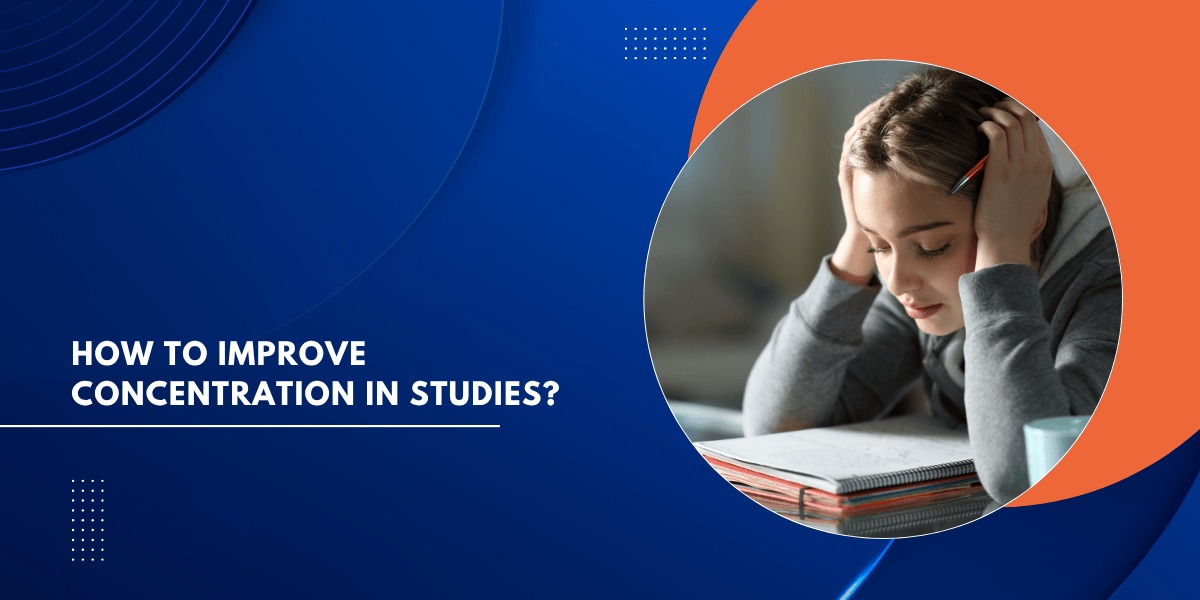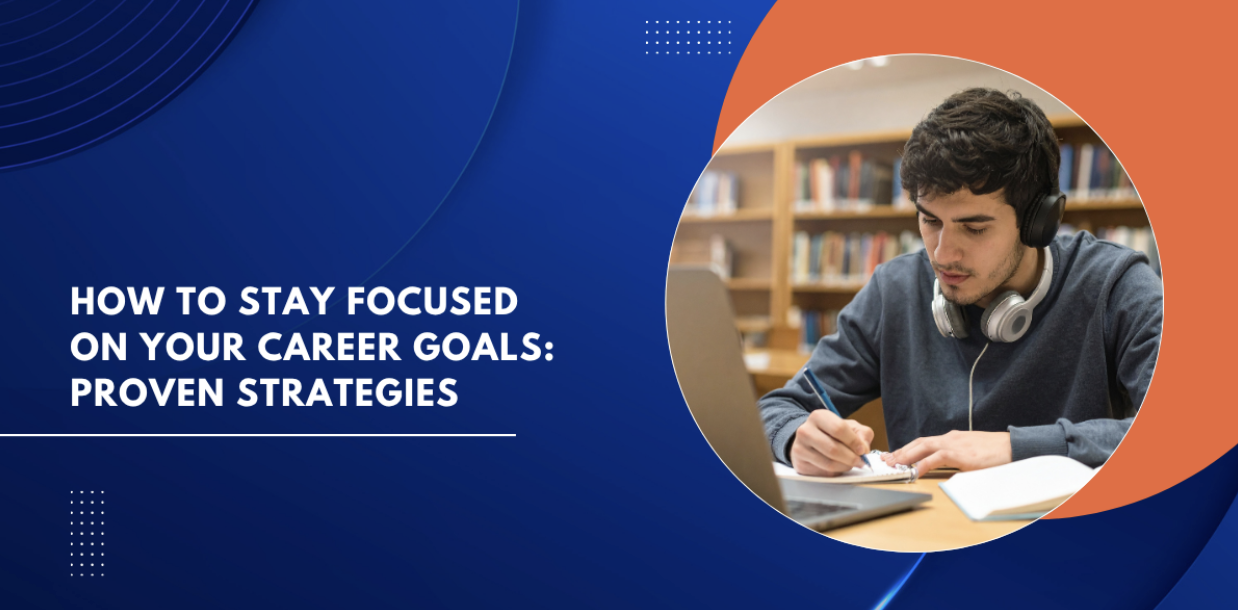I meet students and parents almost every day, and one concern that keeps cropping up is this: “My child is intelligent, but they just can’t concentrate.” Or from the student’s side: “I want to study, but my mind keeps wandering.”
Sound familiar? You’re not alone.
When we talk about academic success, people often focus on study hours, coaching classes, or how many mock tests one solves. But in my opinion, the real game-changer is concentration.
If you’ve ever found yourself reading the same page ten times without remembering a word, you already know how frustrating it can be.
As I often share in our Career Crafting Conversations Podcast, focus isn’t just a study skill—it’s a habit you can build.
And that’s exactly what this guide will help you tackle.
If you’re wondering how to improve concentration in studies, you’re in the right place. Let’s look at a few practical ways to train your mind and boost your study focus.
Why Students Struggle to Concentrate?
Before jumping into tips and techniques, let’s look at some common reasons students find it hard to concentrate while studying:
- Digital distractions (think phones, YouTube, gaming)
- Stress and anxiety
- Lack of sleep
- Unclear goals
- Poor time management
- Unstructured study environments
A Real-Life Example: Meet Krish from Hubbali
I recently met a Class 10 student named Krish from Hubbali, Karnataka. Bright kid—sharp and curious. But his exam scores had taken a hit. When I asked what changed, he admitted that every 10 minutes of study came with 5 minutes of scrolling through Instagram reels.
“It’s just a short break,” he said.
This is what we call micro-distractions—they feel harmless, but they compound.
Those tiny interruptions added up to nearly 3 hours a day.
That’s how small distractions from a smartphone can quietly pile up and eat away at study time. And as we all know, once time is gone, it doesn’t come back. The same student ends up feeling stressed during exams, struggling to finish lessons or revise properly—all because those few minutes here and there went unnoticed.
How to Improve Concentration in Studies? – Start With These Basics

1. Fix the Sleep Cycle First
Let’s start with the most overlooked factor: sleep.
According to a research report published in PsyPost, even a single night of poor sleep can reduce attention and processing capacity by up to 30%. That’s not just feeling tired—it’s your brain operating at a third less than its usual capacity.
I once coached a student preparing for NEET who proudly told me he studied till 3 AM every night.
To him, burning the midnight oil felt like hard work.
But here’s what happened: he couldn’t retain what he read, kept forgetting formulas, and felt constantly foggy.
His scores only started improving after we did one simple thing—fixed his sleep schedule.
Teenagers need 8–10 hours of sleep, according to the Sleep Foundation. Anything less, and focus takes a hit—no matter how many hours you spend with your books.
2. The 45-15 Rule
If you’re wondering how to improve concentration in studies without feeling exhausted, this one’s for you.
Try the 45-15 Rule:
- Study: 45 minutes
- Break: 15 minutes
Not a 1-hour break. Not a “quick” scroll that turns into a 30-minute reel spiral.
During your break, get up, stretch, walk around, or drink water—just keep away from screens. Your brain needs a proper reset, not more stimulation.
Why 45 minutes? Because that’s roughly how long our brain can stay locked in before it starts to drift. Don’t push beyond that unless you’re fully in the zone—and even then, pause shortly after.
Pro tip: Set a timer so you don’t lose track. Let the timer handle the discipline, so your mind can focus on the task.
3. Create a Study Zone
This might sound simple, but it works. Have a fixed place where you study every day. Not your bed. Think clean desk, good lighting, and a chair that doesn’t make you slouch.
I once worked with a student who kept switching study spots—kitchen table, balcony, the floor. Her brain never settled into “study mode.” Once she set up a proper desk, her focus noticeably improved within a week.
Think of your brain like a machine—if the setup keeps changing, it takes longer to warm up.
Here’s a quick guide:
✅ Do this:
- Use the same spot daily
- Keep your desk clean and clutter-free
- Choose a chair that supports your back
- Ensure good lighting (preferably natural light)
- Keep water nearby
❌ Avoid this:
- Studying on the bed or couch
- Studying in noisy or high-traffic areas
- Keeping your phone on the desk
- Mixing your study area with entertainment zones
4. Take Back Your Time: The Power of a Digital Detox
Let’s not pretend this isn’t a major reason students lose focus. Smartphones are designed to hijack attention—every ping, buzz, and scroll is a distraction in disguise.
A study by Microsoft found that the average human attention span has dropped to just 8 seconds in the smartphone era—shorter than a goldfish.
Now imagine trying to study with that kind of mental wiring.
I’ve read that the average Indian teen spends over 7 hours a day on screens, between schoolwork and entertainment. That’s nearly half the day—gone.
I always tell students: during study time, keep your phone in another room. Out of sight, out of mind.
One of my students, Aanya, scored below 70% in her first term. She agreed to try a 30-day social media detox using screen blockers. Her final score? 89%.
Here are a couple of tools that helped her (and might help your child too):
📱 Forest – Rewards you for staying off your phone by growing a virtual tree
🧠 Focus Mode (built into Android/iOS) – Temporarily disables distracting apps
5. Set Smaller Goals (and Tick Them Off!)
I’ve seen students sit down to study with vague goals like “finish Science.” That’s way too broad—and honestly, a bit overwhelming. Instead, break it down:
👉 Instead of: “Study Maths”
✅ Try: “Solve Q1–Q10 from Exercise 3.1”
Smaller tasks are easier to start and quicker to complete.
Here’s why this matters:
Every time you check off a small task, your brain celebrates. It releases dopamine—the “feel-good” chemical linked to motivation and focus. That tiny reward creates a positive feedback loop. You feel good, so you want to keep going. Momentum builds, and focus improves without even forcing it.
If you’re serious about how to improve concentration in studies, try using a planner. It doesn’t have to be fancy—even a notebook works.
Just write the date, list 3–5 specific goals, and strike them off as you go.
Trust me—there’s real power in that little tick mark.

6. Mindfulness and Deep Breathing
I know some of you might roll your eyes at this — but hear me out. I’ve personally used this technique before competitive exams, and it works.
Mindfulness isn’t about sitting cross-legged and chanting. It’s about slowing down and being fully present. Just five minutes of deep breathing before you start studying can help calm your nervous system and reduce that mental fog.
👉 Try apps like Insight Timer (it’s free and easy for beginners) or Headspace if you don’t know where to start.
Why breathing helps focus: There’s research from Harvard Medical School showing that mindfulness and meditation can boost concentration and memory. Even 10 minutes a day adds up over time.
🎯 Coaching tip: Do it right before your study block begins — it helps your brain switch gears and settle into work mode faster.
Real-Life Scenario: The Comeback Kid
Let me share one more real story.
I worked with a student named Rhea who was preparing for the JEE. Her concentration was all over the place. She’d sit down to study and somehow end up cleaning her room. Classic procrastination disguised as productivity.
So, we made just three small changes:
- Set a daily study slot (10 AM to 1 PM)
- Switched her to the 45-15 rule
- Used the Forest app to lock her phone
Three months later, she ranked in the top 2,000.
What changed? Not her intelligence — her study habits.
She didn’t turn into a genius overnight. She just focused.
For Parents: Supporting Without Adding Pressure
For parents reading this — I understand your concern. You’re not alone. But saying “just concentrate more” isn’t as helpful as it might seem.
Instead, try asking:
👉 “What’s been distracting you lately?”
👉 “What helped you focus today?”
Be part of the solution, not the pressure.
In one case I handled, a father removed Wi-Fi access during his son’s study hours. The result? The child started sneaking mobile data instead. The intent was right, but the method backfired.
What worked better was a mutual agreement: phone-free study blocks with small rewards afterward. That kind of collaboration builds trust — and better habits.
✅ Quick Recap – How to Improve Concentration in Studies
- 🛌 Fix your sleep schedule
Aim for 8–10 hours of sleep. No brain works well when it’s running on fumes. - ⏱️ Use the 45–15 study-break rule
Study: 45 mins → Break: 15 mins
Pro Tip: Set a timer so you don’t overshoot either block. - 📚 Set up a dedicated study space
A clean desk + good lighting = better focus. - 📵 Do a digital detox (use blocker apps)
Try apps like Forest or Stay Focused to limit distractions. - ✅ Set small, specific goals
Don’t just say “Study Math.” Say “Solve Q1–Q10 from Ex 3.1.”
Pro Tip: Use sticky notes or a planner to write and tick off each task. - 🧘 Try 10 minutes of mindfulness daily
Even a short breathing session before study can help reset your brain.
👨👩👧 Communicate openly with parents
Replace pressure with partnership. It works better — for both sides.
What About Food and Hydration?
Yes, even what you eat can impact your focus. I’ve seen plenty of students skip breakfast or grab chips during study breaks. That doesn’t help.
Water = Brain Fuel. Food = Focus.
Foods like nuts, fruits, eggs, and whole grains support brain function. And water? Non-negotiable.
A study by the University of Illinois showed that students who stayed well-hydrated during exams performed better than those who didn’t. Considering the brain is about 75% water, even slight dehydration can affect memory and attention.
Here’s a simple rule I give my students:
- 🍽️ Eat real food every 4 hours
- 💧 Drink water every hour (Keep a bottle on your desk — make it a study buddy!)
What If I Still Can’t Focus?
Sometimes, despite our best efforts, something deeper might be going on.
That’s a fair question. Even after trying all these tips, some students still struggle to concentrate. If this happens consistently—and starts affecting marks, sleep, or mental health—it’s a good idea to check in with a counsellor or doctor.
Conditions like ADHD (Attention Deficit Hyperactivity Disorder) often go unnoticed in teenagers. It’s not always extreme. Sometimes it shows up as constant restlessness or zoning out.
I’m not saying every student who struggles with focus has ADHD—not at all. But I’ve seen students improve dramatically once they received the right support. So if nothing seems to work, don’t hesitate to ask for help.
In Conclusion
If you’re still wondering how to improve concentration in studies, remember to be kind to yourself. Everyone faces focus struggles—even adults. You’re not lazy, broken, or expected to be perfect. The students who succeed aren’t always the smartest; they’re the ones who manage their time, shape their environment, and bounce back when things don’t go as planned.
To get started, try these steps:
✅ Keep phones and distractions out of your study zone
✅ Stick to the 45-15 rule to avoid burnout
✅ Sleep 8 hours, not 4 — the brain needs rest
✅ Set realistic goals and tick them off
✅ Try five minutes of breathing before study time
✅ Keep water nearby and don’t skip real meals
✅ Talk to parents, teachers, or counsellors if it feels like too much
Still struggling with concentration? Let’s build habits that stick. Join our focus workshops or get 1:1 support through NextMovez.
We also offer free resources and tools to help students build focus step-by-step — no superhero skills required. Connect with us today and take that first step toward steady success, both in exams and beyond.






















